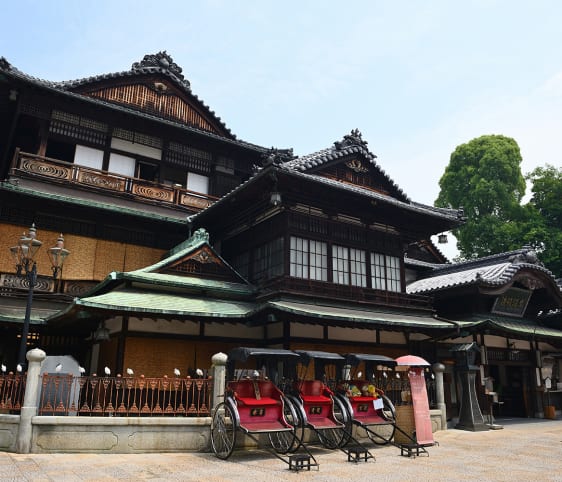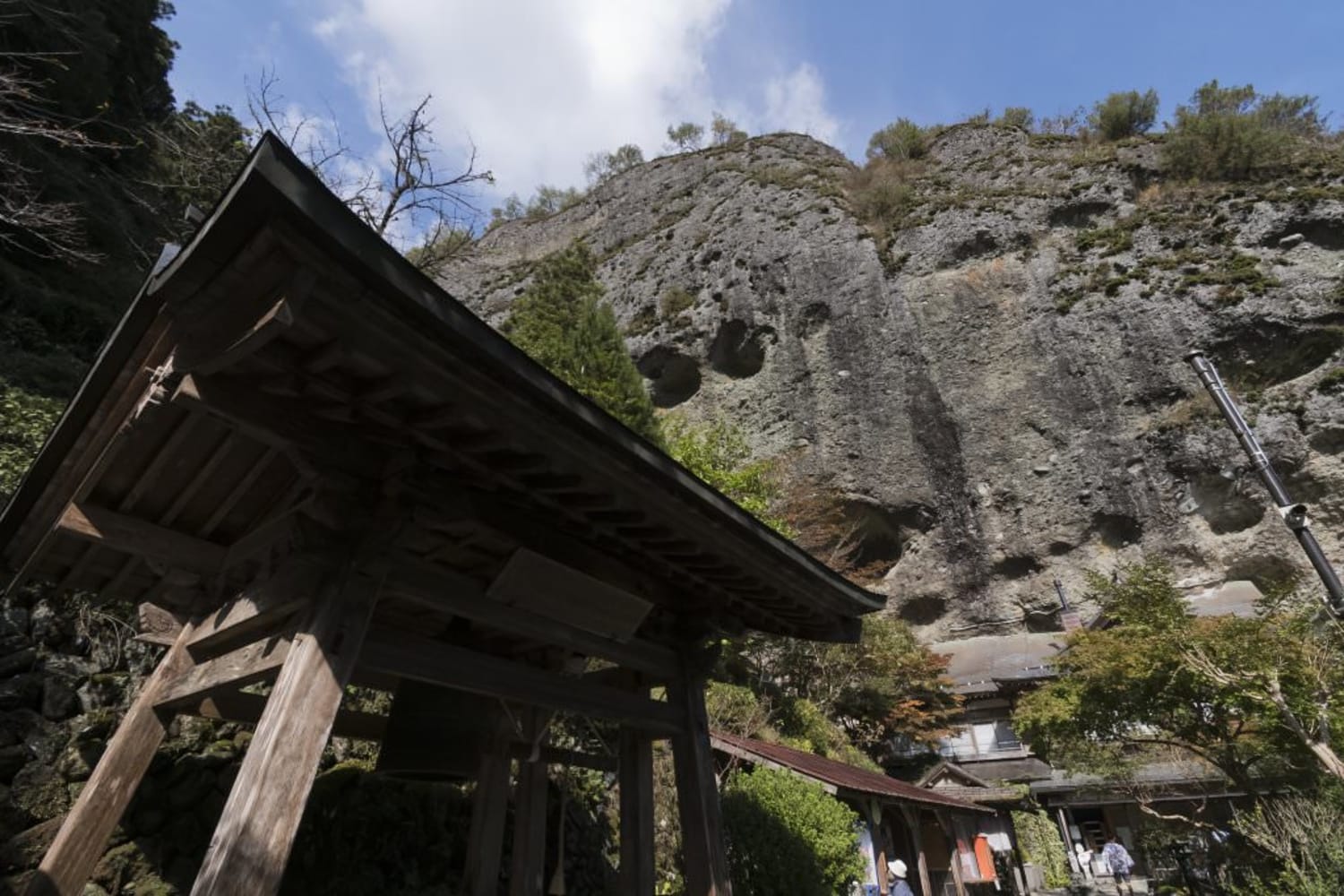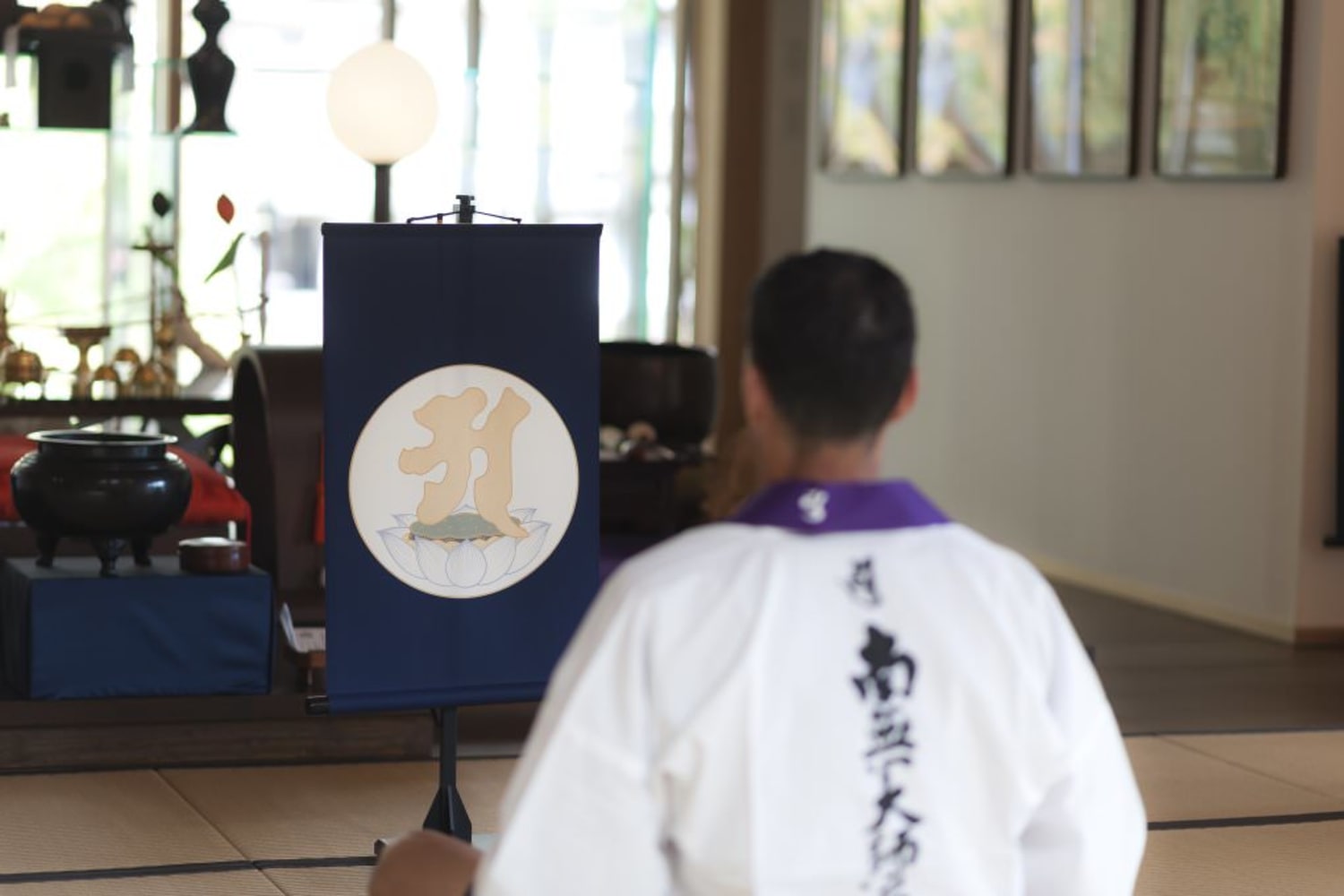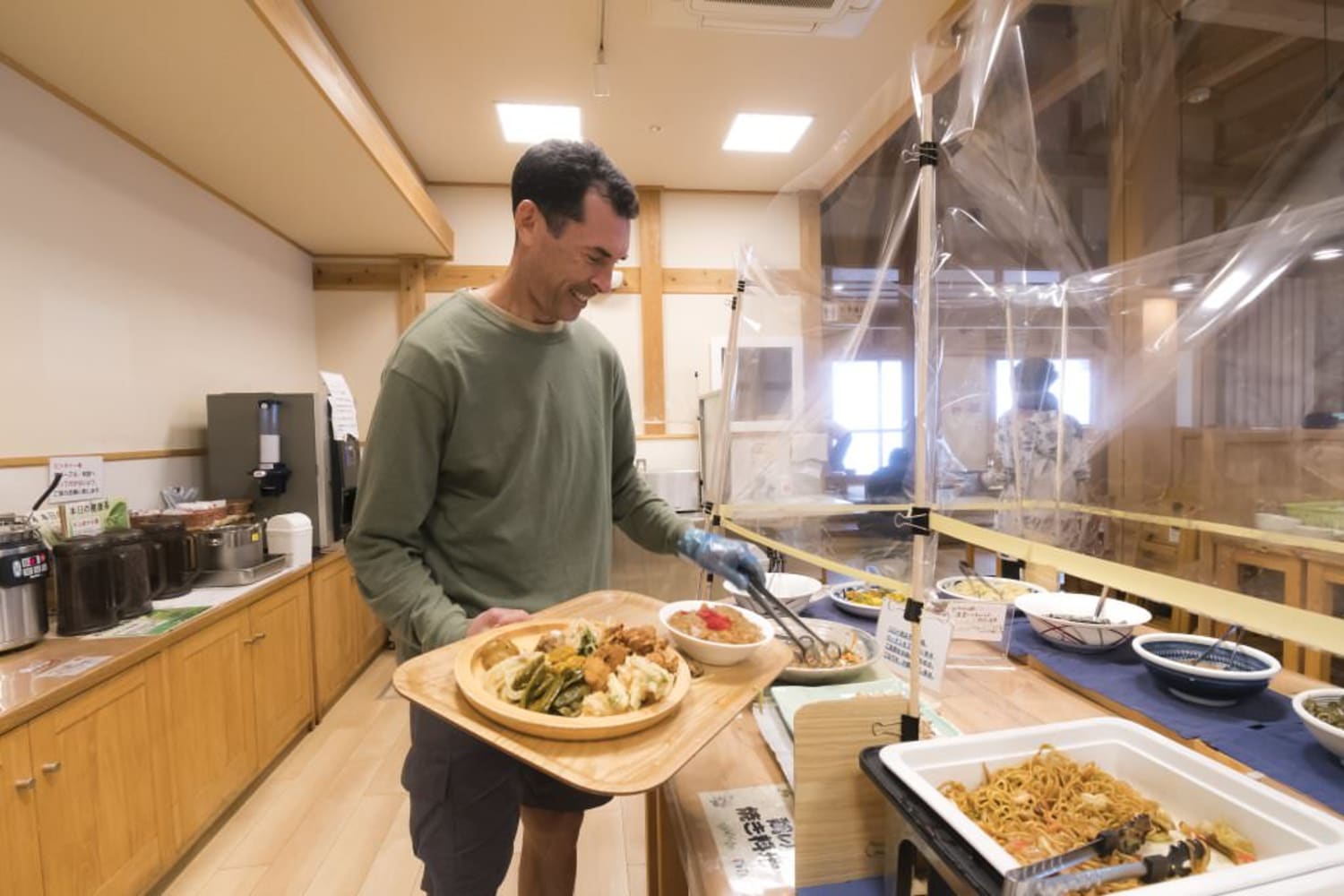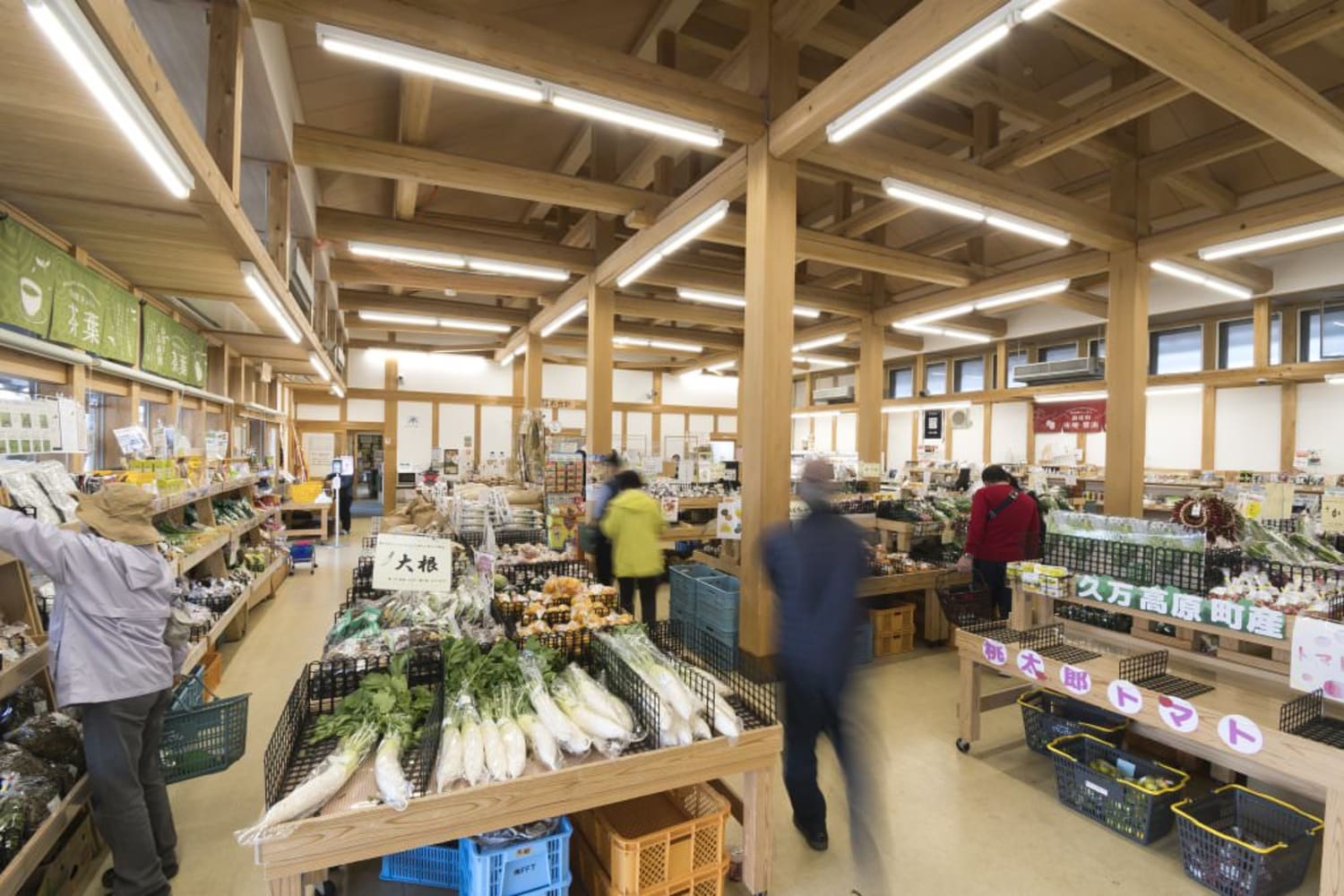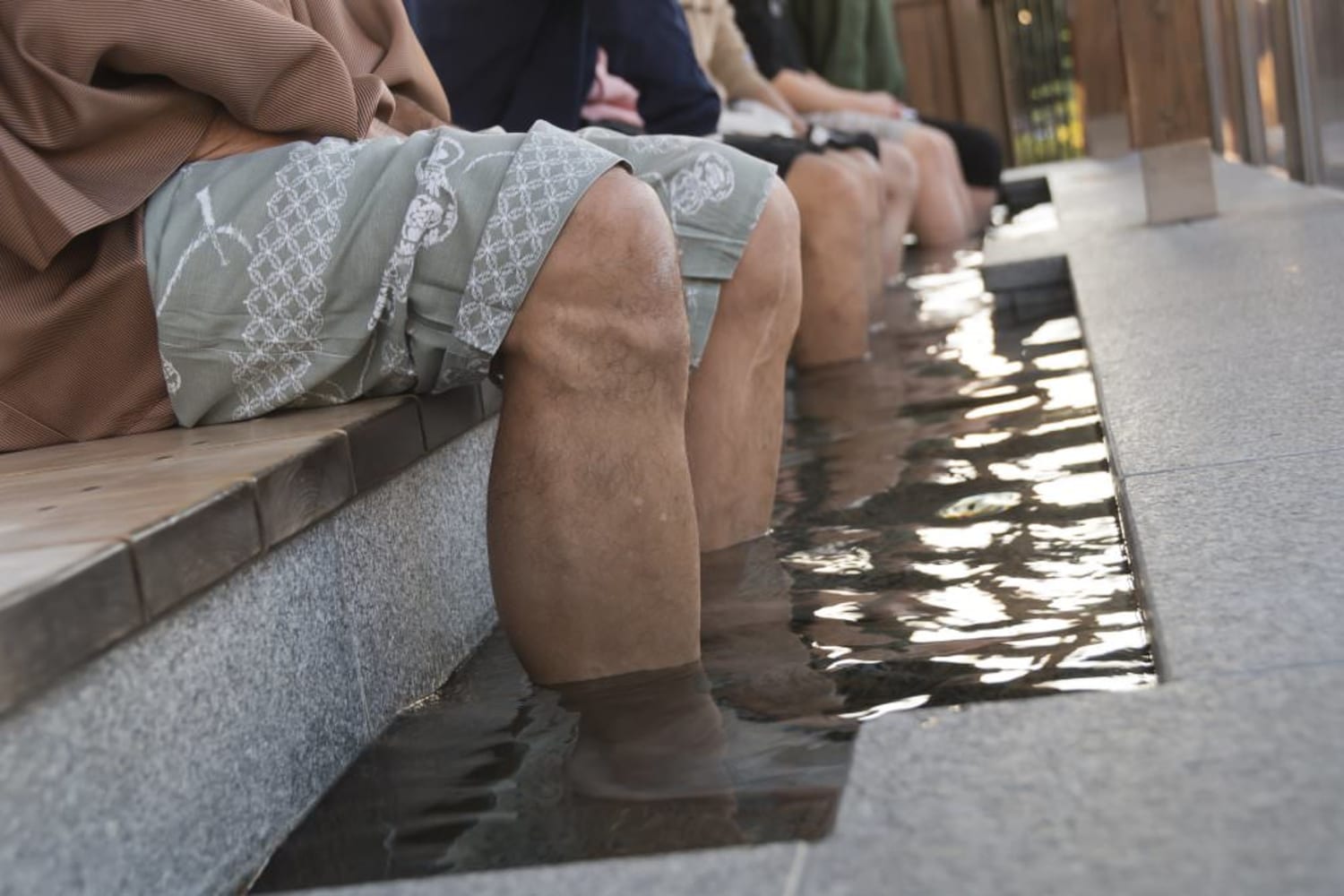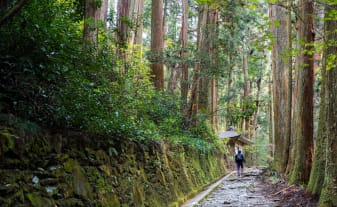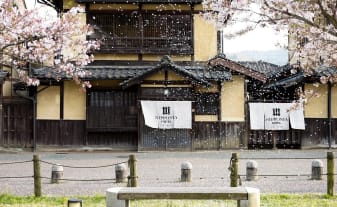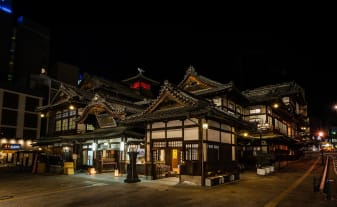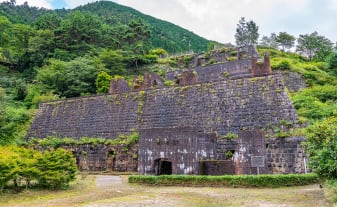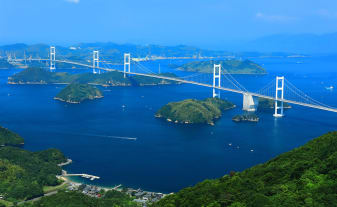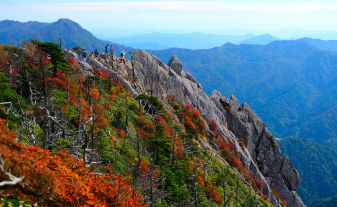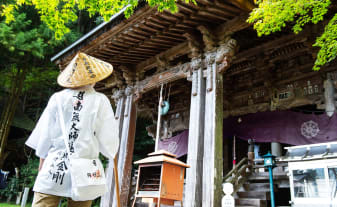 STORIES & GUIDES
STORIES & GUIDES
[Day 3] Discovering Ehime’s Cultural & Geological History, from the Mountains to the Towns

Ehime’s rich history is evident in centuries-old places of worship and hot springs, as well as time-worn rock faces that are many times older. To find it, you just have to know where to look.
-
Iwayaji Temple – mountain temple with an unforgettable location and approach
The steep path to Iwayaji Temple is the longest of Shikoku’s famed 88-temple pilgrimage circuit. Climbing the stone steps, I reached the temple’s majestic wooden main gate and paused to appreciate its architecture before continuing. As I walked, I gazed up at the towering Japanese cedars that lend the atmosphere a dignified, almost solemn quality. At several points along the way stood countless small stone statues of the bodhisattva Jizo, who guides and protects children and travelers. Eventually the temple’s main hall came into view. Its relatively small dimensions and proximity to the huge rock wall that loomed above it made it almost appear to be an extension of its natural surroundings. “The setting is what makes this place so special,” Onishi-san, the temple priest, later told me. “The walk tends to leave visitors with a particularly strong impression.” For me, it was just one of many things I will remember about this 1,200-year-old temple, set into the cliffs among the mountains of Ehime.
Address: 1468 Nanatori, Kumakogen-cho
Access: From JR Matsuyama Station, 1 hour and 10 minutes to Iwayaji bus stop
Phone: +81 892-57-0417
Email: 88iwaya45@gmail.com
Website: https://shikoku88-iwayaji.com/en/ -
Ajikan meditation – an exercise in letting go...and finding peace
As I sat cross-legged on the tatami floor, the smell of wood and incense in the air, it was impossible to completely block out the sounds from outside. “This is okay,” Onishi-san had said before our Ajikan meditation session began. “What is important is that we learn to let go of what our senses take in, to not allow what is outside to remain and cloud our minds.” The idea, he’d add later, reflects a greater approach to living. After a few minutes, I adjusted my legs. “Sit however you feel comfortable,” Onishi-san had told me. By the time our fifteen minutes had passed, I’d found that while the world outside had never quite ceased, the one inside me had grown quiet.
Address: 1468 Nanatori, Kumakogen-cho
Access: From JR Matsuyama Station, 1 hour and 10 minutes to Iwayaji bus stop
Phone: +81 892-57-0417
Email: 88iwaya45@gmail.com
Website: https://shikoku88-iwayaji.com/en/ -
Mimidodake Rock – symbol of Ehime’s varied geological history
Like the cliffs of Iwayaji Temple, Ehime is home to a variety of geological wonders. Along the Omogogawa River, just down the road from the cliffs, the Mimidodake Rock stands as one striking example. This limestone formation is an impressive 37 meters tall and 137 meters long, and is adorned on all sides with pine. With sheer walls and an arrowhead shape, the Mimidodake Rock resembles a battleship run aground, inviting you to gaze a bit longer at the natural beauty here.
Address: Shide, Kumakogen-cho, Kamiukena-gun
Access: 50 minutes by car from JR Matsuyama Station -
Restaurant San-San – a taste of home in the Kuma Kogen Highlands
People come from all over to enjoy the Kuma Kogen Highlands’ distinct seasons. “The fall colors in particular bring in lots of customers from out of the area,” explained Masaoka-san, who works at the buffet restaurant at the San-San Roadside Station. “Foreigners walking the temple circuit stop in too.” Masaoka-san takes pride in the quality of their food, made strictly from local produce. “What we make depends on what we get.” They prioritize healthy, natural food with a “natsukashii aji”—a taste that reminds people of home. As I filled my plate a third time, I wondered if I could just make this my home.
Address: 1855-6 Irino, Kumakogen-cho, Kamiukena-gun
Access: 50 minutes by car from JR Matsuyama Station
Open: 11:00 a.m. to 3:00 p.m. (2:00 p.m. last order)
Phone: +81 892-21-3403
Website: https://www.kumakogen-sansan.com/restaurant/ -
Dogo Onsen – rickshaw tour of a historical neighborhood
I felt like royalty sitting in my rickshaw, watching my driver politely navigate the crowded sidewalk. In front of the Shiki Museum, dedicated to the art of Haiku, he told me about Shiki Masaoka, originator of the modern haiku and one of many haiku poets Matsuyama City has produced. Behind the museum, in the vast natural environs of Dogo Park, were the remnants of Yuzuki Castle, dating to the fourteenth century. Down the road, small but stately Dogo Onsen Station, built during the Meiji era (1868–1912), serves as the terminus for the tram lines running from downtown Matsuyama City. Across the street, the Botchan Karakuri Clock plays music every hour, opening up in a display of mechanically dancing figurines. As my rickshaw driver jogged up the shopping arcade and back around to age-old Dogo Onsen, I felt like I had just rolled through history.
Address: In front of Dogo Onsen Honkan, 5-6 Dogoyunomachi, Matsuyama City
Access: 5 minutes on foot from Dogo Onsen Station
Open: 10:00 a.m. to 8:00 p.m. (hours vary by season)
Phone: 090-3183-3683
Email: info@rikisha.net -
Dogo Onsen – soaking in a thousand-year-old tradition
The exterior of Dogo Onsen may look polished, but inside I felt like I had stepped back in time. The wooden interior is neat and clean and breathes of a place old enough to be mentioned in the Man’yoshu, an eighth-century compilation of Japanese poetry. The steps and winding corridors give the sense this place was not built all at once, but evolved over time. Legend has it that Prince Shotoku enjoyed these hot springs (onsen) in the late sixth and early seventh centuries. More recently, this was known as the most favored spot of Natsume Soseki, famed Japanese writer who lived for a time here in Matsuyama City. It’s quite an understatement to say the world outside Dogo Onsen has grown a bit since its inception over a thousand years ago. But inside, while you are soaking in the hot spring water, history, not time, is what fills the steamy air.
Address: 5-6 Dogoyunomachi, Matsuyama City
Access: 5 minutes on foot from Dogo Onsen Station
Open: 6:00 a.m. to 11:00 p.m.
Phone: +81 89-921-5141
Website: https://dogo.jp/en/ -
Yamatoya Honten Inn – relaxed intimacy in a traditional Japanese inn
Before you even reach the lobby of the Yamatoya Honten Inn, you get the feeling you’ve arrived at a special place. “We want to provide an elegant, peaceful environment,” explained Mizuki-san, nodding toward the narrow, dim entrance corridor and the tidy Japanese garden that separates it from the hotel’s comfortable interior. “We want our guests to feel relaxed, unhurried.” To this end, the Yamatoya Honten Inn is imbued with subtle details: the mud silt of the walls in each room comes from a specific place in Kyoto; the rocks placed in the onsen are meant to resemble the islands of the Seto Inland Sea.
Parents staying with children are made to feel equally welcome. The traditional yatai stalls near the onsen baths offer complimentary Japanese sake for the adults and candy for the kids. Guests young and old are free to get up on the authentic Noh stage in the courtyard and act out an impromptu performance, selecting from the available props for additional fun. Full Noh performances are also held regularly.
In the evening, I sat down to a traditional Japanese meal, placed with care on my table in the dining area. Sashimi, Pacific saury tempura, and grilled beef were just a few of the exquisite dishes served, along with locally crafted Dogo Onsen beer. With the sound of a koto drifting in from some unseen corner, I couldn’t imagine a more relaxing, more Japanese existence.
Address: 20-8 Dogoyunomachi, Matsuyama City
Access: 5 minutes on foot from Dogo Onsen Station
Phone: +81 89-935-8880
Email: yoyaku@yamatoyahonten.com
Website: https://www.yamatoyahonten.com/en/
-
Hot Springs
-
Cultural Heritage
-
Central Ehime (Chuyo)
-
Historic Sites & Monuments
-
Hotels & Accommodations
-
Temples
Related Articles
Central Ehime (Chuyo)
Explore imposing hilltop castles, iconic bath houses, vermillion shrines, otherworldly karst formations, and the tallest mountain in western Japan.